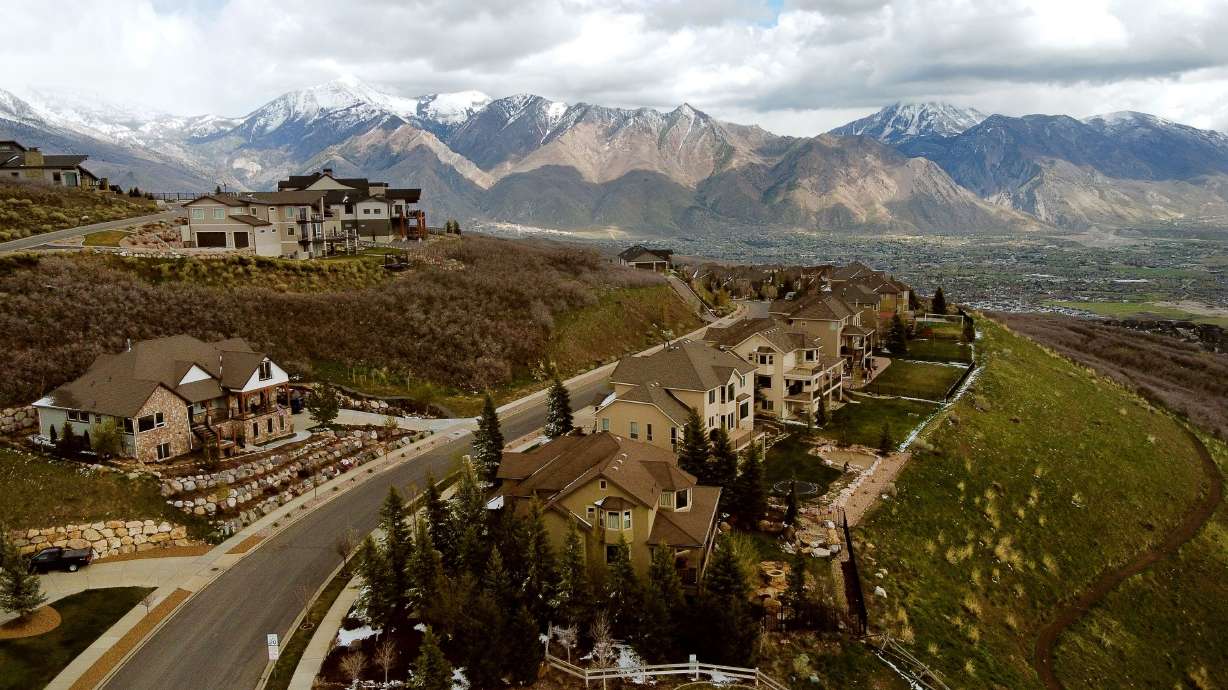Estimated read time: 4-5 minutes
This archived news story is available only for your personal, non-commercial use. Information in the story may be outdated or superseded by additional information. Reading or replaying the story in its archived form does not constitute a republication of the story.
SALT LAKE CITY — The COVID-19 pandemic unpredictably accelerated the U.S.'s housing price increases to remarkable levels over the past two years.
But even as economists say the nation's housing market is overvalued in terms we've never seen before, they're not predicting a nationwide crash or market correction.
They have, however, predicted that some cities — especially a major one in the West — could see home prices drop up to 10% over the next year or so.
That's what Mark Zandi, chief economist at Moody's Analytics, recently told Fortune, joining with other national experts who have said the nation's hot housing market is showing signs of cooling as inflation and the Federal Reserve's interest rate hikes continue to up the pressure.
What they're saying: Zandi told Fortune he doesn't predict a nationwide home price correction. However, in coming months, he said that cooling effect should deepen, and he predicted by this time next year, year-over-year home price growth should hit zero.
As for some of the nation's most overpriced housing markets — of which, Boise has topped multiple lists — Zandi predicted some could see home prices drop up to 10%.
- "In terms of house prices, I expect (growth) to go flat … there will be markets where we will see a price decline of around 5% to 10%," Zandi told Fortune.
- While Zandi said he doesn't see a housing bubble — which would require both home price overvaluation and speculation in the market — he did say there is some "speculation creeping in," in places like Phoenix and Charlotte, Fortune reported.
The numbers: Moody's Analytics shared with Fortune its proprietary analysis of U.S. housing markets. According to that analysis of 392 metropolitan statistical areas, 96% are "overvalued," with 149 that are overvalued by at least 25%.
- "The most overvalued being Boise, where home prices are 73% above what fundamentals would support," Fortune reported. "The fact Boise is 'overvalued' relative to local incomes isn't surprising given the influx of California ex-pats who bought there during the pandemic."
The Boise story: It's not the first time Boise — along with other major metros in the West, including some in Utah — have been on the national radar for what researchers have deemed "overvalued" housing markets.
Boise has consistently topped Florida Atlantic University and Florida International University's top 100 U.S. housing market rankings, ranked for its high housing premium estimated at 75% in March.
The Utah story: The three Utah cities that have ranked in the nation's top 10, close behind Boise, include Ogden, with an over 63% premium; Provo, with an over 54% premium; and Salt Lake City, with a 53.8% premium, according to Florida Atlantic University's research.
Moody's Analytics analysis also put the Utah metro areas on the map for overvaluation. The analysis ranked the Ogden-Clearfield metro area as 45% above market fundamentals, the Salt Lake City area 31% over, and the Provo-Orem area 20% over, according to an interactive map published by Fortune using Moody's analysis.
The analysis also highlighted two other metro areas in Utah: Logan, valued at 35% over market fundamentals, and, to the south end of the state, St. George at 27% over.
The Arizona story: Another state in the West, Arizona, sticks out in Moody's analysis. The Lake Havasu City-Kingman metro area is 56% over market fundamentals, according to the analysis. Flagstaff is 51% over. Prescott Valley is 43% over. And the Phoenix-Mesa-Chandler area is 46% over.
The big picture: The West, especially in fast-growing states like Idaho and Utah, is ground zero for wild housing prices.
As the pandemic spurred Americans to reevaluate their lives in search of bigger homes and larger lots at smaller price points, many relocated to states like Idaho and Utah, spurring "insane" housing price increases.
Utah was already the fastest-growing state in the country over the past 10 years, and was already grappling with a housing shortage that fueled its affordable housing crisis before the pandemic hit. Here, local experts have said rising mortgage rates will likely only slow — not stop — housing price increases while pricing out even more potential homebuyers.
As Utah continues to see extremely low inventory, local experts say it's hard to fathom a housing "bubble" popping anytime soon.









